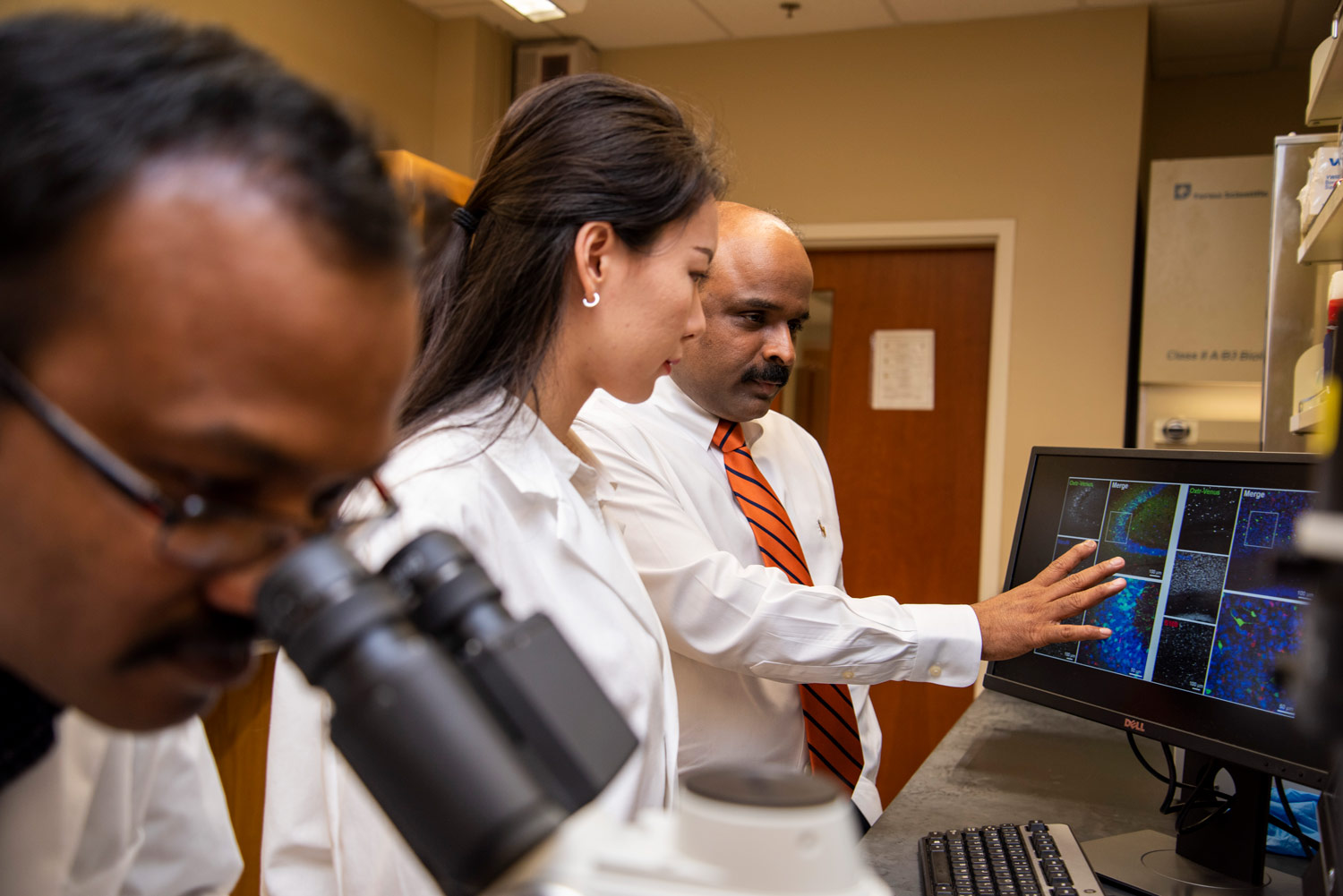Diabetes & Alzheimer’s: Breaking the link
Jack Smith| Auburn, AL

Dr. Ramesh Jeganathan reviewing slides with members of his lab team.
More than 5 million Americans, and 40 million patients worldwide, suffer from Alzheimer’s disease.
Yet as Baby Boomers get older and life expectancy increases, the problem will only get worse—much worse. One in two who live to be 85 will be at risk.
By 2030, Alzheimer’s disease will affect an estimated 150 million people. More than 80 percent of women who live to age 90 will be diagnosed, and the most expensive disease in the U.S. will increase in cost fivefold.
Auburn neuroscientist Dr. Ramesh Jeganathan is on the front line of researchers searching for answers to the disease, which has baffled scientists since the first patient was diagnosed over a century ago.
“We have made no progress at all in treating Alzheimer’s since the first patient of Dr. Alzheimer’s in 1906,” Jeganathan said. “We only treat the symptoms.”
After seeing, the devastating effects of the disease early in his career and how little could be done to treat patients, Jeganathan decided to dedicate his research, to finding a cure on Alzheimer’s disease.
“Alzheimer’s disease is one of the biggest medical and social challenges of our generation,” he said. “I think about this all the time.”
Jeganathan is a molecular neuroscientist in the Department of Nutrition, Dietetics and Hospitality Management program in the College of Human Sciences at Auburn.
His research focuses on the link between type 2 diabetes and Alzheimer’s disease. The connection is an alarming fact for the State of Alabama, where nearly one in three residents is obese—and more susceptible to type 2 diabetes.
Studies show patients in midlife with type 2 diabetes have a significantly increased risk of developing Alzheimer’s. Jeganathan wants to know why.
“If we can find the cause, we can cure the disease,” he said.
At his lab, Dr. Jeganathan is exploring the genes, molecules and cellular processes that may cause and promote Alzheimer’s in type 2 diabetes and obese patients.
“We’re looking for ways to disrupt the diabetes-Alzheimer’s link,” Jeganathan said.
The ultimate goal of Jeganathan’s research is to develop a drug to treat type 2 diabetes linked Alzheimer’s. If he can break the link, Jeganathan will substantially improve the life expectancy and quality of life of type 2 diabetic patients.
While the outlook for Alzheimer’s patients and the search for a cure is a daunting task, there have been significant developments in Jeganathan’s lab. His research laboratory group discovered two new genes that play a key role in insulin signaling/ type 2 diabetes.
“This discovery has received lots of attention in the diabetes and Alzheimer’s fields and beyond,” he said.
Jeganathan is passionate about his own research, but he’s equally committed to making the case that more must be done to stop the irreversible disease.
“Since 1901, medicine has advanced greatly. We discovered antibiotics and vaccines to protect us from infections, we developed many treatments for cancer, statins for heart disease and much more. But, we have made essentially no progress in treating Alzheimer’s.”
More funding for research is one pressing need in the fight against Alzheimer’s.
“We understand less about the science of Alzheimer’s disease than other diseases because we have invested less time and money researching it,” Jeganathan said. “It is one of the top 10 causes of death worldwide, but it is the only one we cannot prevent, cure or even slow down.”
While Jeganathan is immersed in his laboratory every day, searching for answers, he never forgets the reason he cares so deeply about his research.
It’s the patients and their families.
“They cannot speak for themselves, and their caregivers are tired,” he said. “We need to speak up for them and demand a cure for this disease.”